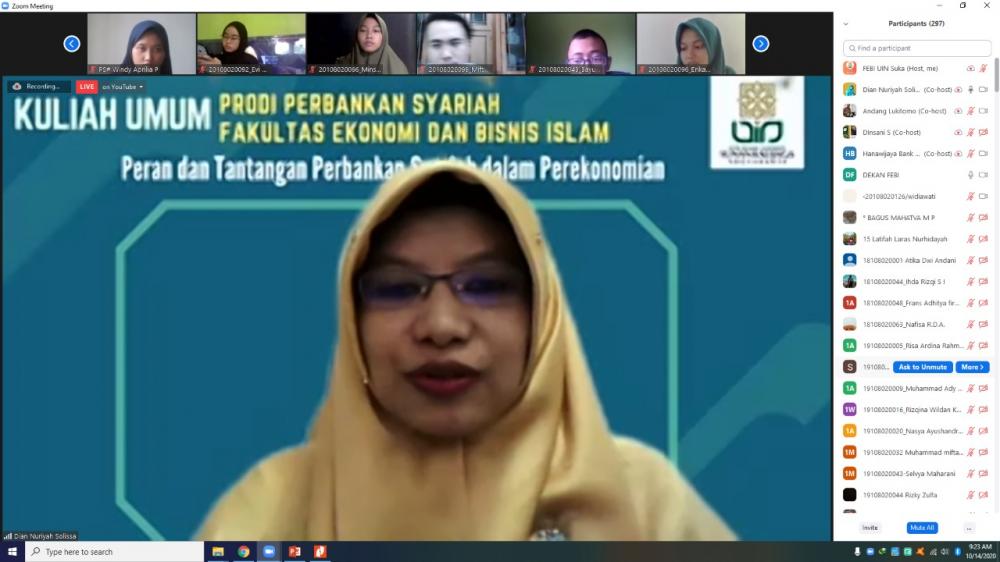Studium Generale of Islamic Banking Study Program

Studium Generale of Islamic Banking Study Program
The Islamic Banking Study Program FEBI held a studium generale with the theme “The Role and Challenges of Islamic Banking in the Economy” on Wednesday (14/10/2020).
This event is part of the orientation series for new students of the Islamic Banking program for the academic year 2020/2021. The Islamic Banking Study Program’s studium generale featured speakers with backgrounds in Islamic banking such as Hanawijaya (Director of Bank Jateng Syariah) and Andang Lukitomo (Former Culture and Change Management Head BSM).
The event was hosted by Mr. Faisal Reza, a 2018 Islamic Banking student, with the recitation of the holy verses of the Qur’an by Ms. Inayatul Muna, and moderated by Mrs. Dian Nuriyah Solissa, SHI, M.Si. It was conducted online using video conferencing.
The event was attended by the Dean of FEBI, Dr. Afdawaiza, M.Ag, the Head of the Islamic Banking Study Program, Ruspita Rani Pertiwi, S.Psi, M.M, and other Islamic Banking lecturers, as well as all new students of the 2020/2021 academic year of the Islamic Banking program.
The opening of the studium generale commenced with a speech by Mrs. Ruspita Rani Pertiwi, S.Psi, M.M, the Head of the Islamic Banking Study Program. She expressed that this studium generale serves as basic orientation for Islamic banking students, particularly those in the Faculty of Islamic Economics and Business.
This was followed by a speech from Dr. Afdawaiza, M.Ag, stating that the theme of this studium generale is highly relevant for discussion in the current situation and that it is the opportune time for Islamic Banking to enhance its role in the economy amidst the Covid-19 pandemic.
The characteristics of Islamic banking differ from conventional banking, as it operates on a profit-sharing financing model developed through musyarakah and mudharabah financing products, in contrast to the interest-based system used in conventional banking. Therefore, the presence of Islamic banking is expected to have a positive impact on the growth of the real sector. One business unit crucial for driving the growth of the real sector is micro, small, and medium enterprises (MSMEs), which currently hold a significant position in the national economy. There are high expectations for the role of Islamic banks in developing MSMEs. However, the national Islamic financial system faces fundamental problems that hinder various involved parties from optimizing the function of Islamic as a blessing for all humanity. The primary challenge for Islamic financial institutions is to address issues stemming from a framework based on interest and the instability of currency standards, particularly in the midst of the Covid-19 pandemic.
The event consisted of two sessions. The first session featured Hanawijaya, the Director of Bank Jateng Syariah, providing an in-depth explanation of Islamic Banking and its role in the current economy. This was followed by a second session on Human Resource Competence in improving the Quality of Islamic Banking by Andang Lukitomo (Former Culture and Change Management Head BSM).
Contributor: Alfi Ayu Ilhamna, Editor: AN”
